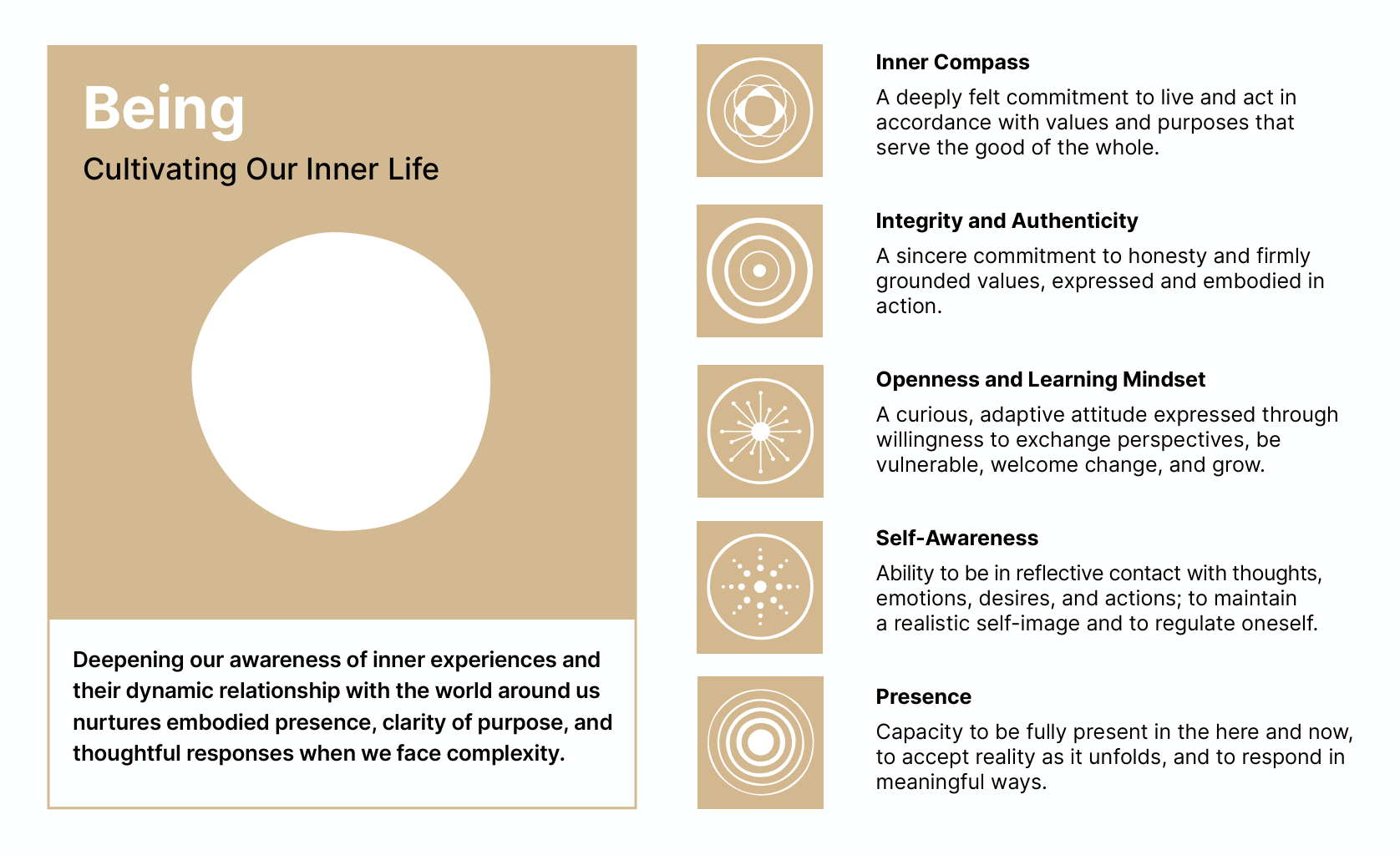Exploring the IDGs: Being
The Inner Development Goals (IDGs) are a non-profit and open-source organization established to bring the power of inner development to global challenges faced by humanity. The IDGs believe, as do I, that personal development is necessary for societal change. The IDGs can help. They are a blueprint of the capabilities, qualities, and skills needed to achieve the 17 Sustainable Development Goals and outer change. As a personal bonus, these can also create a pathway to discover more meaning, fulfillment, and purpose in your work and life.
I’m looking at each dimension of the Inner Development Guide and sharing some questions and ideas to help you identify skills that can bring focus to your developmental goals and commitments. And I’d like to start with the category that is the foundation of my coaching practice.
Cultivating Our Inner Life
Cultivating our inner life centers around developing and deepening our relationship to our thoughts, feelings, and body to help us be present, intentional, and non-reactive when we face the complexity of our relationships and world today.
Relationship to Self pertains to your inner compass.
Your sense of integrity and authenticity.
Your curiosity, your growth, and your learning mindset.
Your self-awareness.
Your ability to remain open and present.
We can start by just asking ourselves a few questions.
How do I experience my inner compass? How does it guide me in my choices?
Can I identify my top values? Do I live my life guided by my values and purpose?
How well can I recognize and name my emotions? Am I aware of them as they arise? Can I tend to my emotions as the situation calls for and respond rather than react?
Do I have a willingness to be vulnerable and work on self-development without a driving and unforgiving self-improvement agenda?
Do I make time for reflection and discovery to better know my own thoughts, feelings, and desires?
Do I live in the present, the here and now, without judgment?
Spend some time reflecting on these questions. If you have time, write down your thoughts. You may want to explore the resources I share around Parts Work and developing a deeper relationship with yourself.
What next? The IDGs offer a free online Aware app from 29k. 29k is a non-profit organization and community on a mission to make personal growth available for everyone, for free!
I’d also like to give you a values exercise you can practice on your own.
For more communication resources, visit the Center for Non-Violent Communication (NVC). My signature learning program, “Clear, Compassionate & Conscious Communication-Following the Thread of Our Core Needs,” focuses on enhancing self-awareness, emotional intelligence, and communication skills using a structured model of human experience. Participants will learn how to navigate conflict, express their needs clearly, and build stronger personal and professional relationships. I provide a list of feelings, needs, and values.
I’d love to hear from you if coaching could help support this developmental discovery for yourself. Unlike some assessment approaches, I don’t take a gap analysis or start from a place of deficiency. We start where you are and explore the threads together. Reach out if you’d like to chat.
Values Exercise
The purpose here is to define your values as a person. What drives your motivation, thinking, and decision-making?
Take a moment to read through the values below.
Choose 10 values that resonate the most with who you are as a person and note why these are important to you.
Narrow the list of 10 values to 5 values.
From your 5 remaining values, choose your top 3 personal values.
Once you have your 3-5 value words, perhaps share them with someone who can discuss how these words reflect their perceptions of your values and how they see you living these values.
Trust and Security
Health
Movement / Exercise
Rest/Sleep
Wellbeing
Certainty
Predictability
Clarity
Stability
Reliability
Order/Structure
Support
Harmony
Fairness
Honesty
Equality
Peace
Wholeness
Relatedness
Belonging
Cooperation
Inclusion
Partnerships
Participation
Appreciation
Companionship
Relationships
Family
Love/intimacy
Nurturing
Tenderness
Warmth
Acceptance
Care
Compassion
Respect / Self Respect
To be seen & heard
Community
Effect
Significance
Meaning
Purpose
Contribution
Dignity
Efficiency
Self Acceptance & Self Care
Self-expression
Understanding
Awareness
Clarity
Focus
Efficacy
Excitement
Aliveness
Autonomy
Choice
Freedom
Power
Responsibility
Authenticity
Integrity
Spontaneity
Development
Competence
Creativity
Self Connection & Self Knowledge
Learning
Growth
Challenge
Discovery
Curiosity
Play
Fun
Relaxation
Ease
Rejuvenation
Pleasure
Discover more by Following The Thread of Our Core Needs.

